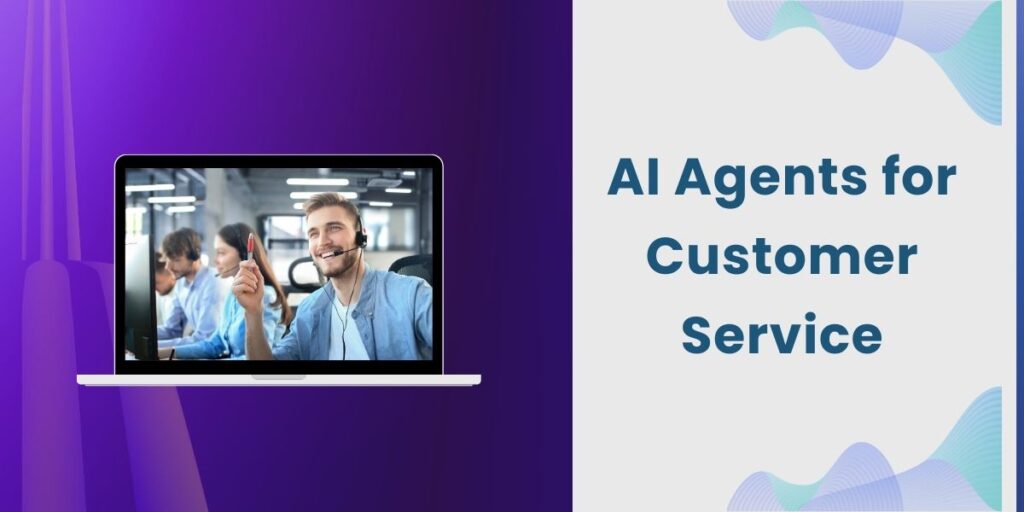AI agents, from chatbots to autonomous assistants, are causing a revolution in customer service. These smart systems take care of repetitive support jobs, give quick answers, and help human agents solve tricky questions. As AI keeps getting better in 2025, customer support is getting quicker more precise, and more tailored to each person—this is changing how companies talk to their customers in a big way.
In this guide, we will review top AI agents for customer service, explore their benefits, present real-world examples, and highlight key statistics that reflect their growing impact.
Top AI Agents for Customer Service
Check out some of the top-notch AI tools that are transforming customer service automation:
- Salesforce Agentforce (Einstein Agent) – This tool can handle up to 85% of inquiries on its own, thanks to smart routing and automated responses that leverage CRM data.
- Yellow.ai – A versatile platform that supports over 135 languages across more than 35 channels, making conversational AI and automation a breeze.
- Haptik – A robust conversational assistant that’s widely used in sectors like banking, telecom, and consumer services, both in India and beyond.
- Synthflow AI – These voice-based AI agents respond to customer queries and schedule service requests in under 400 milliseconds.
- Amelia by SoundHound – This solution is making waves in healthcare, retail, and banking by automating front-line interactions and providing real-time support to agents.
- Gupshup Auto Bot Builder – Instantly creates AI-powered bots from your existing documentation or product catalogs for chat and voice interfaces.
- Zendesk AI Assistant – Integrated within Zendesk hubs, it tags tickets, offers smart replies, and connects across various support channels.
- Re:amaze AI – Tailored for e-commerce, it auto-suggests replies, manages ticket tagging, and helps guide FAQs across social media and the web.
- Tidio (Lyro AI) – A multilingual chat and email agent that comes with channel integrations and automated triage capabilities.
- Freshchat AI – Offers support in over 30 languages, providing rich conversational experiences across web, email, and mobile platforms.
These solutions range from chat-focused assistants and voice agents to automated routing and ticket-handling systems, ensuring comprehensive coverage across customer service touchpoints.
Benefits of AI in Customer Service
The following are the main benefits AI offers to operations support:
- 24/7 Availability: AI agents guarantee that inquiries are answered around-the-clock by offering unbroken support.
- Faster Response Time: Automated responses expedite resolution and lower average wait times.
- Scalable Support: Manages demand surges without requiring corresponding increases in staff.
- Enhanced Efficiency: AI handles repetitive tasks, while human agents handle more complex inquiries.
- Increased Consistency: Clients consistently receive precise and consistent responses.
- Savings: AI-powered assistance lowers labor expenses and decreases the volume of support.
- Smart Ticket Routing: Agents automatically tag and route tickets to the relevant team or workflow with smart ticket routing.
- Multilingual Support: AI agents handle client interactions in several languages without the need for extra staff.
- Actionable Metrics: AI dashboards monitor customer satisfaction, resolution time, and support performance.
- Improved Experience: Accurate and tailored answers boost client happiness and brand loyalty.
Check Out – AI Agent for Sales
Examples of AI Agents in Customer Service
Here are real use cases demonstrating AI agent effectiveness:
- Salesforce Agentforce: Now automates 84–85% of routine service requests for major companies, allowing over 2,000 support staff to transition from repetitive tasks to more complex, high-value service activities, boosting both efficiency and service quality.
- Comcast AMA Agent: Integrated into agent workflows, the AMA tool cuts context-switching time by 10%, helping agents stay focused and work faster. It is well-received internally, with 80% of users giving positive feedback on its impact.
- Synthflow Voice AI: Powers real-time voice conversations for more than 1,000 enterprise clients, significantly reducing call-handling time and operational effort while maintaining smooth, responsive customer interactions.
- Amelia Voice AI: Widely deployed in healthcare and finance, Amelia streamlines patient and customer communications, enabling quicker resolutions and higher satisfaction by automating common requests and simplifying follow-ups.
AI agents thus deeply assist both self-service and hybrid support models while boosting overall agent efficacy.
AI Agents in Customer Service Statistics (2025)
Here are key adoption and performance metrics from 2025:
- 80% of companies are using or planning to adopt AI-powered customer service chatbots.
- 85% of enterprises are now using AI agents in customer support operations.
- 80% of L1/L2 queries in customer service are being handled by AI agents, reducing human workload.
- 79% of companies report already using AI agents, with 66% citing measurable productivity gains.
- 57% of adopters report cost savings, 55% report faster decision-making, and 54% highlight improved experience.
- 59% of consumers believe AI will reshape customer interactions significantly within two years.
- The AI assistance feature at Comcast led to 10% faster resolution times and 80% positive feedback among agents.
- Agents supported by AI saw productivity gains of 15% on average, especially among less experienced staff.
These figures underscore the rapid evolution and real impact of AI agents in modern customer support.
Conclusion
AI agents have shifted from being a novelty to becoming a core component of modern customer service. From advanced chat workflows and voice assistants to intelligent call routing and seamless CRM integration, these tools help companies cut costs, resolve issues more quickly, and deliver better customer experiences.
Whether a business uses established solutions such as Salesforce Agentforce, Yellow.ai, or Haptik, or opts for voice technologies like Amelia or Synthflow, the benefits are widely accessible. Research consistently shows that AI-powered interactions are rapidly becoming what customers expect—meaning companies that lag in adoption risk losing their edge.
To build service operations that can withstand future demands, it’s important to define clear goals, choose platforms that can scale, track performance metrics, and treat AI as a collaborator that enhances productivity rather than a full replacement for human agents. As usage expands, AI agents will keep opening the door to greater efficiency and stronger engagement.
FAQs
Q1. How are AI agents different from chatbots?
Ans:- AI agents work autonomously, operate across multiple systems and channels, and can take initiative without waiting for a prompt. Chatbots, on the other hand, tend to be scripted, reactive, and limited to single-session interactions.
Q2. Do customers actually prefer AI agents to human representatives?
Ans:- Many customers appreciate the speed and accuracy AI provides for self-service. Research indicates that nearly 6 in 10 people expect most customer interactions to be AI-driven within the next couple of years.
Q3. Can AI agents help lower operating costs?
Ans:- Absolutely. More than half of organizations using AI report noticeable cost reductions, and around two-thirds see improvements in employee productivity.
Q4. Will AI completely replace human support teams?
Ans:- Not in the near term. AI can manage a large share of routine inquiries — up to 80% of basic, first-level questions — but complex or sensitive situations still benefit from human expertise.
Q5. Are AI agents safe and compliant?
Ans:- Top providers design their solutions with enterprise-level compliance in mind. Still, it’s essential to verify a vendor’s stance on data protection, encryption, and privacy standards.
Q6. Is it worthwhile to invest in voice-enabled AI agents?
Ans:- Yes. Platforms like Synthflow and SoundHound deliver voice responses in under 400 milliseconds and can handle entire call workflows without human intervention.
Q7. How do businesses track the performance of AI agents?
Ans:- Organizations often monitor metrics such as resolution rates, average resolution time, cost per support ticket, employee satisfaction, and customer sentiment trends.


